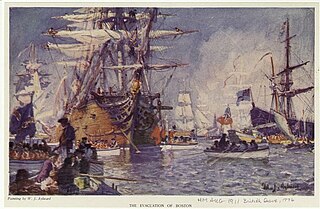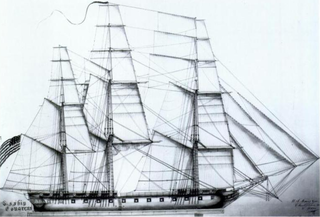Related Research Articles

The Battle of Bennington was a battle of the American Revolutionary War, part of the Saratoga campaign, that took place on August 16, 1777, on a farm in Walloomsac, New York, about 10 miles (16 km) from its namesake, Bennington, Vermont. An American force of 2,000 men, primarily New Hampshire and Massachusetts militiamen, led by General John Stark, and reinforced by Vermont militiamen led by Colonel Seth Warner and members of the Green Mountain Boys, decisively defeated a detachment of General John Burgoyne's army led by Lieutenant-Colonel Friedrich Baum, and supported by additional troops under Lieutenant-Colonel Heinrich von Breymann.

Keene is a city in Cheshire County, New Hampshire, United States. The population was 23,047 at the 2020 census, down from 23,409 at the 2010 census. It is the county seat and the only city in the county.

Roxbury is a town in Cheshire County, New Hampshire, United States. The population was 220 at the 2020 census.

Major-General John Stark was an American military officer who served during the French and Indian War and the Revolutionary War. He became known as the "Hero of Bennington" for his exemplary service at the Battle of Bennington in 1777.

The Siege of Boston was the opening phase of the American Revolutionary War. In the siege, American patriot militia led by newly-installed Continental Army commander George Washington prevented the British Army, which was garrisoned in Boston, from moving by land. Both sides faced resource, supply, and personnel challenges during the siege. British resupply and reinforcement was limited to sea access, which was impeded by American vessels. The British ultimately abandoned Boston after eleven months, moving their troops and equipment north, to Nova Scotia.

Henry Dearborn was an American military officer and politician. In the Revolutionary War, he served under Benedict Arnold in his expedition to Quebec, of which his journal provides an important record. After being captured and exchanged, he served in George Washington's Continental Army. He was present at the British surrender at Yorktown. Dearborn served on General George Washington's staff in Virginia.

Enoch Poor was a brigadier general in the Continental Army during the American Revolutionary War. He was a ship builder and merchant from Exeter, New Hampshire.

Joseph Warren, a Founding Father of the United States, was an American physician who was one of the most important figures in the Patriot movement in Boston during the early days of the American Revolution, eventually serving as President of the revolutionary Massachusetts Provincial Congress. Warren enlisted Paul Revere and William Dawes on April 18, 1775, to leave Boston and spread the alarm that the British garrison in Boston was setting out to raid the town of Concord and arrest rebel leaders John Hancock and Samuel Adams. Warren participated in the Battles of Lexington and Concord the following day, the opening engagements of the American Revolutionary War.

Increase Sumner was an American lawyer, jurist, and politician from Massachusetts. He was the fifth governor of Massachusetts, serving from 1797 to 1799. Trained as a lawyer, he served in the provisional government of Massachusetts during the American Revolutionary War, and was elected to the Confederation Congress in 1782. Appointed to the Massachusetts Supreme Judicial Court the same year, he served there as an associate justice until 1797.

William Heath was an American farmer, soldier, and political leader from Massachusetts who served as a major general in the Continental Army during the American Revolutionary War.

The 1st Rhode Island Regiment was a regiment in the Continental Army raised in Rhode Island during the American Revolutionary War (1775–83). It was one of the few units in the Continental Army to serve through the entire war, from the siege of Boston to the disbanding of the Continental Army on November 3, 1783.

Isaac Wyman (1724–1792) was born January 18, 1724, in Woburn, Massachusetts, to Joshua Wyman and his wife Mary Pollard. In 1747 he married Sarah Wells of Franklin, Massachusetts. They had nine children altogether.

John Warren was a Continental Army surgeon during the American Revolutionary War, founder of the Harvard Medical School and the younger brother of Dr. Joseph Warren.
Francis Gardner was an American politician and a United States representative from New Hampshire.

Major-General John Sullivan was a Continental Army officer, politician and judge who fought in the American Revolutionary War and participated several key events of the conflict, including most notably George Washington's crossing of the Delaware River. He was also a delegate to the Continental Congress, where Sullivan signed the Continental Association. After the war, he served as the third governor of New Hampshire and was appointed as a United States district judge of the United States District Court for the District of New Hampshire.
David Shepard was an American doctor, a member of the Massachusetts House of Representatives, a Minuteman, and surgeon in the Continental Army. He was an early proponent of inoculation to prevent smallpox.

James Hackett (1739–1802) was an American shipbuilder in New Hampshire in the late 18th century. He was responsible for the construction of a number of significant Revolutionary War-era warships for the fledgling country, including the Raleigh, Ranger, America, Congress, Portsmouth, two cutters for the United States Revenue Cutter Service, as well as the Crescent, built for Algiers as tribute. As a teenager, he served with Rogers' Rangers during the French and Indian War. His later military service included serving as lieutenant colonel in the New Hampshire Militia during the Revolutionary War and after in several different units.

Benjamin Simonds was a militia commander of Massachusetts during the French and Indian War and the American Revolutionary War. He was colonel of the all-Berkshire regiment of about five hundred men known as the “Berkshire Boys” during the American Revolutionary War. His regiment, the 2nd Berkshire County Regiment, notably fought in the Battle of Bennington in the summer of 1777.
Batcheller's Cave is a small cave in Roxbury, New Hampshire, United States, said to be the hiding place of Breed Batcheller, a town founder who failed to support the rebellion of the colonies against England in the Revolutionary War.
References
- 1 2 3 4 "History of Roxbury". Town of Roxbury - A good dam town. Town of Roxbury. Archived from the original on 2015-10-18. Retrieved 28 October 2015.
- ↑ Frank, Carolyn (2004). "The "Hated Tory of Roxbury" stood up for what he believed in". Keene Sentinel. Retrieved 29 October 2015.
- ↑ Temple, Josiah Howard; Adams, Charles (1887). History of North Brookfield, Massachusetts: Preceded by an Account of Old Quabaug, Indian and English Occupation, 1647-1676; Brookfield Records, 1686-1783. Boston: town [Boston, printed]. p. 217 . Retrieved 28 October 2015.
Breed Batcheller.
- ↑ Griffin, Simon Goodell (1904). The History of Keene, New Hampshire. Heritage Books. p. 161. ISBN 9780917890215 . Retrieved 28 October 2015.
- ↑ Peery, Susan. "Parsing the Language of Revolution". Keene State College. Keene State Today. Archived from the original on 12 September 2015. Retrieved 28 October 2015.